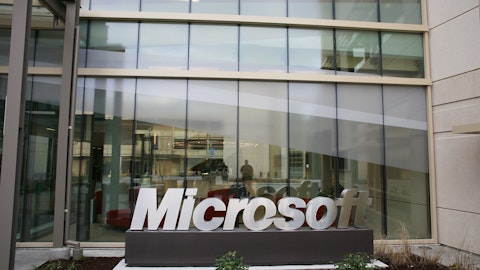In this article, we discuss 5 best COVID stocks to buy now. If you want to see more stocks in this selection, check out 10 Best COVID Stocks To Buy Now.
5. Teladoc Health, Inc. (NYSE:TDOC)
Number of Hedge Fund Holders: 32
Teladoc Health, Inc. (NYSE:TDOC) is a New York-based virtual healthcare company operating in the United States and internationally. The company offers a portfolio of online services and solutions covering non-urgent, episodic, chronic, and complicated medical conditions. Although Teladoc Health, Inc. (NYSE:TDOC) stock has crashed more than 90% from its highs, its total addressable market is growing and the valuation is more reasonable. Teladoc Health, Inc. (NYSE:TDOC) also stands to gain now that Amazon.com, Inc. (NASDAQ:AMZN) announced plans to close its Amazon Care telehealth business by the end of this year. It remains one of the best COVID stocks to buy now.
On September 29, RBC Capital analyst Sean Dodge reiterated an Outperform rating on Teladoc Health, Inc. (NYSE:TDOC) but lowered the price target on the stock to $35 from $53. While the analyst remains positive on Teladoc Health, Inc. (NYSE:TDOC) stock, he urged some short-term caution into Q3 results given higher risk to guidance on the back of ongoing deterioration in the BetterHelp consumer outlook. The stock is trading at under 2-times expected FY23 sales, and he also sees most of the negative factors being “likely priced in”.
Cathie Wood’s ARK Investment Management is the largest Teladoc Health, Inc. (NYSE:TDOC) stakeholder, with 20.2 million shares worth approximately $692 million. Overall, 32 hedge funds were bullish on Teladoc Health, Inc. (NYSE:TDOC) at the end of Q2 2022, compared to 36 funds in the preceding quarter.
Here is what Greenhaven Road Capital has to say about Teladoc Health, Inc. (NYSE:TDOC) in its Q1 2022 investor letter:
“Teladoc is the largest telehealth provider in the US and has recently begun to expand internationally. TDOC’s platform enables an ever-expanding list of patient-doctor interactions (including those for primary health care, mental health issues and chronic condition management) to transition from an on-site visit to one that can be done remotely with full video- based interaction. TDOC provides its platform of services on both a business-to-business and direct-to-consumer basis, through monthly subscription-based relationships. For its core business-to-business clients, the company contracts with a wide range of entities, including large scale employers (the company currently contracts with over 50% of the Fortune 500), health plans, health systems, and medical insurance companies, which currently cover more than 50 million members. For these customers, the company provides a win-win-win, as patients spend no time traveling and less time waiting, doctors are more efficient seeing more patients in less time, and payers (employers and plan sponsors) save money while being able to offer a highly popular additional benefit for their employees. This B to B market is projected to be a +$100 billion market opportunity and TDOC is the clear global market leader. For its direct-to- consumer clients, the company provides a growing suite of services for individuals to have affordable access to on-demand and scheduled medical services, for which their current insurance does not provide reimbursement (such as extended mental health counseling).
Although the company has been growing steadily for well over a decade, the business has transformed over the past few years as the COVID pandemic caused a significant increase in the demand for virtual healthcare. In addition, the company’s 2020 acquisitions of Livongo, the leader in virtual chronic condition management, and InTouch, a competitive telehealth platform, materially broadened the company’s product offerings. At its recent analyst day, management guided to 25-30% top line growth for each of the next three years, exiting 2024 with more than $4 billion in annual revenue. The company also anticipates expanding margins by 100-150 basis points per year in each of the next three years, while still accelerating its investments in marketing and R&D. As with many of our recent purchases, we took advantage of the decline in the company’s shares (down a breathtaking 70% from its 2021 high of almost $300 per share) to establish a small position in Teladoc.”





